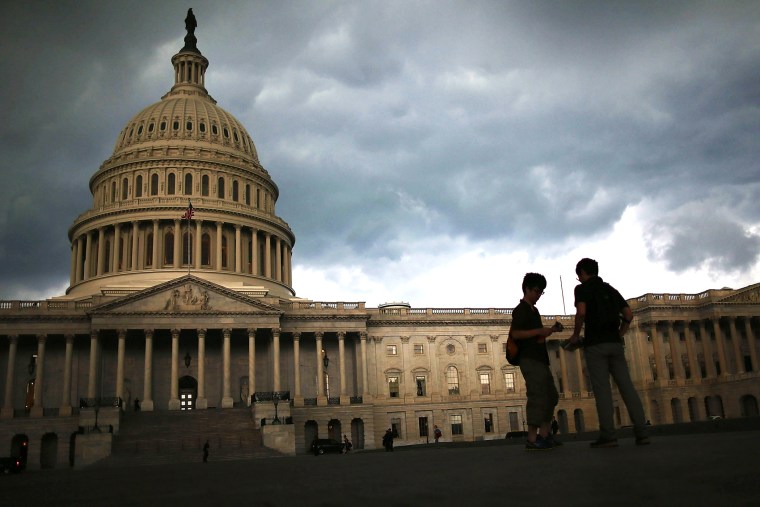We knew the Senate would today hold their first votes to end the government shutdown since the crisis began five weeks ago. We also knew the two pending measures would each need 60 votes, and neither was likely to receive them.
With this in mind, the fact that both bills came up short this afternoon surprised no one, but that doesn't mean the results weren't interesting.
Six Republican senators crossed the aisle on Thursday to vote for a Democratic measure to end the 34-day government shutdown, but the proposal still failed in the Senate.The Democratic measure, which would have reopened federal agencies until Feb. 8 but provided no funding for a border wall, was defeated in a 52-44 vote. Moments earlier, the Senate failed to advance a Republican spending measure proposed by President Donald Trump that would have provided $5.7 billion for his border wall in exchange for temporary protections for so-called Dreamers brought illegally to the country as children.
Let's flesh this out a little. First up was the White House's plan, which received 50 votes. One Senate Democrat, West Virginia's Joe Manchin, sided with Trump and the GOP, while two Senate Republicans, Arkansas' Tom Cotton and Utah's Mike Lee, voted against it. They did so, not because they're moderates but because they thought the president's proposal wasn't far enough to the right.
The Democratic alternative, which was simply a clean bill with no extraneous demands, ended up with 52 votes, fueled in part by the half-dozen Republicans -- Tennessee's Lamar Alexander, Maine's Susan Collins, Colorado's Cory Gardner, Georgia's Johnny Isakson, Alaska's Lisa Murkowski, and Utah's Mitt Romney -- who ignored Trump's wishes and sided with the Democratic minority.
Depending on one's perspective, there are a couple of ways to look at these outcomes. The glass-half-full reaction is that the Democrats' plan to end the shutdown received more votes than Trump's plan, even in the Republican-led Senate. It should be increasingly obvious to everyone than a clean bill is the quickest and most sensible solution to this mess.
The glass-half-empty reaction is that a month ago, a clean spending bill cleared the Republican-led Senate on a voice vote. Today, only six GOP senators were willing to support the same policy.
So what happens now? No one knows for sure. The demise of both alternatives will likely prompt GOP leaders to argue that it's time for a new round of negotiations. The problem with that, of course, is that there isn't much to negotiate: Democrats aren't asking for anything.
The "compromise" advocates are basically arguing that the solution is figuring out how much of Trump's ransom Congress should agree to pay: a little or a lot.
I won't pretend to know how this will play out, but one detail is unavoidable: the president has been obsessed in recent weeks with maintaining "unity" among Republicans. With six GOP senators siding with Democrats today on a clean bill to end the shutdown, the party is far from "unified."
